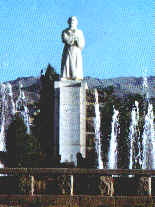|
|
Hamadan, founded in 8th century BC, was called "Hagmatana" by Medes and "Ecbatana" by Greeks, who had heard of its fabulous treasures. It was probably inhabited by 1500 BC, but first prominent is in 6th century BC. "Hagmatana" meant "place of assembly" and served as summer capital for later Achaemenian emperors quartet in the searing plains of Khuzistan and in Fars.
The city was reputed to have enjoyed seven concentric fortification walls, the innermost plated with gold and silver. Gold and silver are also thought to have featured as outer rooftops for the city's richer houses.
Hamadan is at the foot of 12000-foot Alvand Mountain and is one of the highest cities in Iran and in the world. It contrasts pleasant summers with fierce winters.
Its cool summers attracted many rulers, including Cyrus the Great (founder of Persian Empire) who had to defeat his grandfather "Astyages", in 550 BC, to take possession of the city.
Of the pre-Moslem city itself little is visible, though mostly because present-day Hamadan has effectively, and perhaps forever , covered it. Excavations have so far been confined to the fringes of the city of Hamadanian, who include a small but continuous community of Jews.
Small part of ancient Jewish people's history is indeed tied in with Hamadan's 500 BC and perhaps earlier. There are at least 2 Jewish monuments:
One to a local ruler, Hayaqeq, on the other side of Alvand Mountain;
the other known "Tomb of Ester" in Hamadan itself.
Ester and her uncle Mordekhai came to Hamadan is search of refuge for the Jews, and remained to create community that still exists today.
Hamadan once again drew world attention in 11th century, thanks to the singular greatness of one of its residence "Abu Ali Sina" (Avicenna). Philosopher, mathematician and scientist, Abu Ali Sina was perhaps the first "Universal Man". His treatise on medicine was studied in Europe up to 16th century, and his works are still the subject of school curricula. His accomplishments are now honored with massive tomb and museum in Hamadan.

Avicenna
|
|

